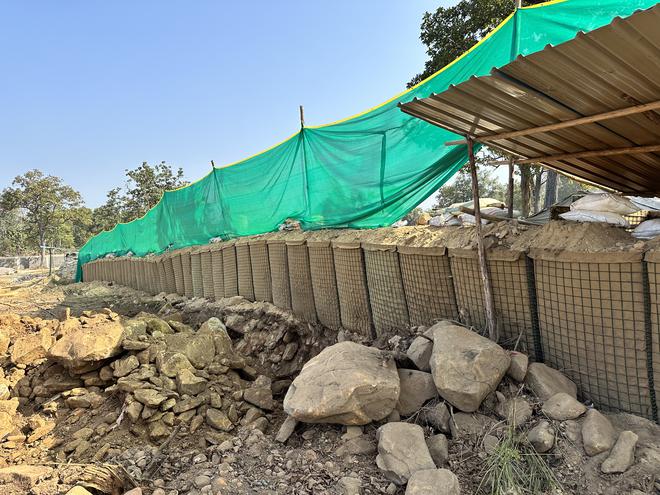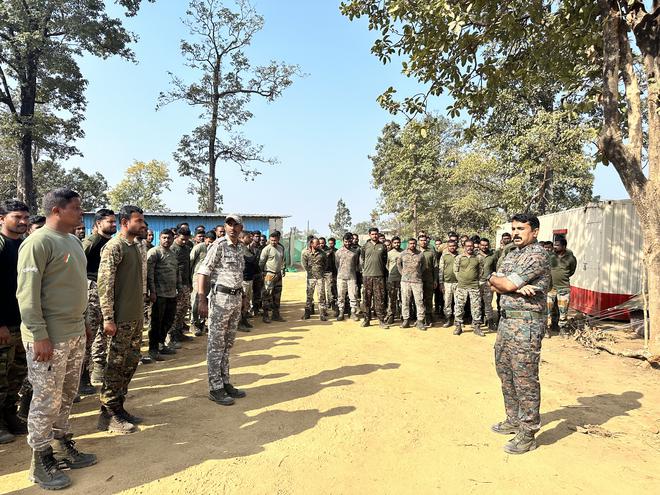Staring into the rugged wilderness and challenging terrain of the legendary Dandakaranya forest, 11 women officers from the Maharashtra police stand ready at a critical outpost in Gadchiroli district’s Wangeturi, a mere 20 kilometres from the Maoist frontier of Abujmarh, also known as the ‘unknown hills’ in the Gondi language native to the region.
Having undergone intensive training in jungle warfare and weaponry, these women are now informally called commandos, and have been positioned at a critical intersection along the so-called Red Corridor, directly facing the Maoist headquarters nestled in these enigmatic hills bordering Chhattisgarh.
Familiar with the treacherous terrain and the intricacies of the local language, and determined to flush out the insurgents, the young officers are part of a 200-strong security force. They are safeguarding a ballistic-proof MAC-walled outpost which was set up within a record 24 hours last November, after a 106-km trek through Chhattisgarh from Gadchiroli town. It is situated at the furthest edge of the left wing extremism (LWE)-affected district, just four kilometres from the ‘unmanned’ Maharashtra-Chhattisgarh border.
Passionate pioneers
“Amidst the potential onslaught of bullets tearing through the forest, we can precisely target the enemy from the outpost. We are trained to deal with such situations and are proud to be part of this elite and historic team,” says Savena Manohar Thakur, 19, from Sironcha, a Maoist hinterland in the district.
Ms. Thakur’s strong will to join the police force began when she was in school. While studying in Class 12, she started preparing and appearing for police exams. A passionate kabaddi player since her school days, she joined the force last May, though she still hopes to complete her college education some day. “My love for ‘dangri suit [police uniform]’ has no limits and I always wanted to fire weapons, so joined the police,” she says, wielding a self-loading rifle.

Her fellow women commandos share similar reasons – a passon for dangri, firearms, and service to society – for choosing this job over pursuing more conventional opportunities in the cities. Recruited last May last year, the 10 officers were handpicked for jungle warfare training and soon deployed at the outpost though they are yet to finish their basic police training.
‘Challenging and dangerous’
“We have to remain vigilant round-the-clock to counter any frontal attacks and deadly ambushes. Every minute is challenging and dangerous, and yet we are happy to be part of this outpost,” says Vishaka Mhashakhetri, 33, a mother of two from Gadchiroli town. Despite her childhood dream of wearing the khaki uniform, she encountered parental disapproval. Eventually, at the age of 24, she married Kishore Zanjad, a farmer; nine years later, she appeared for the police exam with her husband’s support and cracked it.
“I can’t express in words how the young girls of our district feel when they see an armed Mine Protected Vehicle (MPV) and C-60 party patrol the area. It inspired us to take up this ‘odd’ job,” says Ms. Mhashakhetri, adding that her in-laws and husband take care of her two sons. The C-60 commandos, a specialised combat unit of the Gadchiroli police, tackle the Naxal menace in the district.
Leading the squad is sub-inspector Kalyani Kishor Puttewar, 27, of neighbouring Chandrapur district, who was awarded the Veer Nari Shakti Puraskar by Chief Minister Eknath Shinde on January 9. “On paper, I’m their team lead, but ultimately it’s a teamwork. Every member of my team has an inspiring story, and now this posting adds a feather to the cap. We are trained in road openings, area domination, short-range patrolling, ambushes,” she says, recollecting her first encounter with danger last September, when a Maoist surveillance drone approached close to the police team during a night ambush operation at Surjagarh.
Strategic outpost
Currently, the outpost is protected by a 10-feet compound wall with view cutters, morchas and barbed wire; now, a barracks, police station, mess and other essential facilities are being constructed in and around the outpost. It takes at least six hours by road and 20 minutes by chopper to reach the outpost from Gadchiroli town.
“This is the first time we have deployed women officers before an outpost became stable. They were part of the inaugural team and have a key role to play,” says District Superintendent of Police Neelotpal. The outpost will play a strategic role in launching anti-guerrilla operations and quelling the movement of insurgents, as it is positioned at the gateway to the Maoist headquarters, he adds.

An IPS officer of the 2014 batch, Mr. Neelotpal believes that the outpost has struck fear into Maoists as it plugs their transit route to the Maharashtra-Madhya Pradesh-Chhattisgarh (MMC) zone. “Before this outpost was set up, there was a 5,000 sq. km. security vacuum on the border, as Abujmarh is completely under Maoist control. With this, at least we can curb them somewhat,” he says.
Spearheading change
While strategically vital, the outpost is also susceptible. “Given their historical dominance in the area, attacks could come from any direction. Therefore, we have to be vigilant at all times and leave no security lapse as that could prove fatal,” the SP adds.
“In a groundbreaking move for India’s LWE area, we’ve implemented Defencell MAC barriers, a system used by the U.S. troops in Afghanistan and Iraq to protect their compounds. With a 10-feet compound wall and MAC barriers, we have two-layer solid protection,” Mr. Neelotpal explains.
Until the post was set up, Wangeturi had almost no civil administration, earning the moniker ‘Liberated Zone’. Now, the officer believes that there will be a significant transformation in the lives of over 5,000 people in the 13 surrounding villages. Already, 18 kilometres of asphalt road have been laid, and 12 cell towers are to come up soon; further development is expected, in the shelter of the security provided by the outpost and its commandos, including the pioneering team of women.







